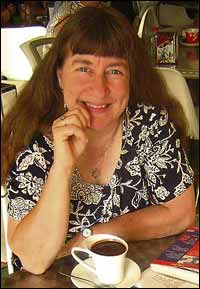|
PROFILE Religious Lindsey was seven before she knew she was Jewish | |
Yet this Jewish studies lecturer, archaeologist and editor was born into an “extremely assimilated family”, knowing nothing about Judaism until her teens. Lindsey’s Jewish mother and non-Jewish father divorced soon after her birth in Sydney, Australia, in 1959. She came to England with her mother, spending time with her grandparents until her mother remarried and settled in Lisgard, Cornwall. Lindsey explains: “My mother’s family were very alienated from Judaism. My great grandparents were the last ones to marry in a synagogue in 1882. “The family had been in England an awfully long time. Some were Spanish and Portuguese and others came over from Germany and Poland in the 19th century. “My mother only found out she was Jewish when she was about 11. She was at South Hampstead High School where they had Jewish prayers. “A girl came up to her and said she should be there because she knew that my mother’s brother went to Jewish prayers. My mother came home and asked her mother if it was true that they were Jewish. “She answered that she was afraid it was.” Lindsey was about seven years old when she discovered her Jewish identity. She asked her mother whether her family had come over with William the Conqueror. Her mother said they hadn’t, telling her they were Jewish. Lindsey said: “I couldn’t do anything about it at seven. But when I was around 11, I started looking up being Jewish in encyclopaedias. “I then took out books on Judaism from libraries. At around 14 I had my own private seder in bed with a haggadah. My family would have been horrified if they had known. I was an underground Jew.” Always fascinated by archaeology, Lindsey studied the subject, together with anthropology at Cambridge University, where she says she spent “three intense years involved in J-Soc”. She said: “J-Soc was my main social scene. I first went to shul in Cambridge. “It was very welcoming and the ideal place to find about Judaism, as well as being very lively intellectually.” Back in Cornwall, on her home visits Lindsey refused to eat meat and expressed her interest in Judaism. Her sights were turned to Israel. After spending two summers on archaeological digs in the country, she made aliyah to study for an MA in archaeology at the Hebrew University. Her first job after graduation was as assistant librarian for the Israel Department of Antiquities. But the pittance she received was so poor that she “moonlighted” by proofreading at the Jerusalem Post. It was there that she met her American-born husband journalist Norman Guthartz, who now sub-edits for Practical Caravan. They have two daughters, Sarah and Rachel. After graduation, Lindsey moved from hands-on archaeology to archaeological translating and editing. She said: “Going on a ‘dig’ is like working on a building site. After about four hours I feel I want to lie down and die.” One of the great things that Lindsey enjoyed about living in Jerusalem was the greater opportunities for self-expression for religious women there. She said: “In the Orthodox synagogue I attended, there were separate Torah readings by women. “And people don’t look at you in Israel as though you have three heads if you study a page of Talmud.” Lindsey, who is to address Manchester’s Yeshurun Synagogue’s Women in Judaism Group on June 23 on Bending not Breaking – the Flexibility of Halacha on Women’s Issues, feels very strongly about the agunah situation in Israel, which she claims is worse than in this country. She says: “It is an absolute scandal, worse than in Britain because there are more of them. “I am absolutely sure that, if it were men who suffered from being agunot and not women, the problem would have been solved long ago. “Halacha is an adaptive system. If it had been rigid, Judaism would have died out long ago.” Despite the fact that Lindsey found religious life in Israel much more exciting than in the UK, after living through the first Intifada and the Gulf War she felt she needed a “short break”. The family came to London in 1997 and have been there ever since. In London, Lindsey has taught many courses at the London School of Jewish studies and edited for the British Museum and the Littman Library of Jewish Civilisation. She is currently studying for a PhD at University College London on the religious lives of Jewish women. She said: “I want to look at folk practices like wearing red threads and having segulot (good luck charms) in pregnancy from an anthropological perspective. “So many of these practices have not been documented.” Lindsey has good reason to be proud of her two daughters. Sarah, 19, recently remade aliyah with a view to joining the Israeli army. “I am glad she feels a responsibility to do her duty as an Israeli citizen,” says Mum. Younger daughter Rachel is just finishing at JFS and is hoping to study theology and religious studies at Cambridge University. Although Lindsey describes Rachel as “very much her own person”, it could be that her interest in comparative religion could have been sparked off by seeing her mother discussing respective religious texts with Christian and Muslim scholars. Lindsey will deconstruct the Midrash at Liverpool Day Limmud on Sunday, May 2.
|
